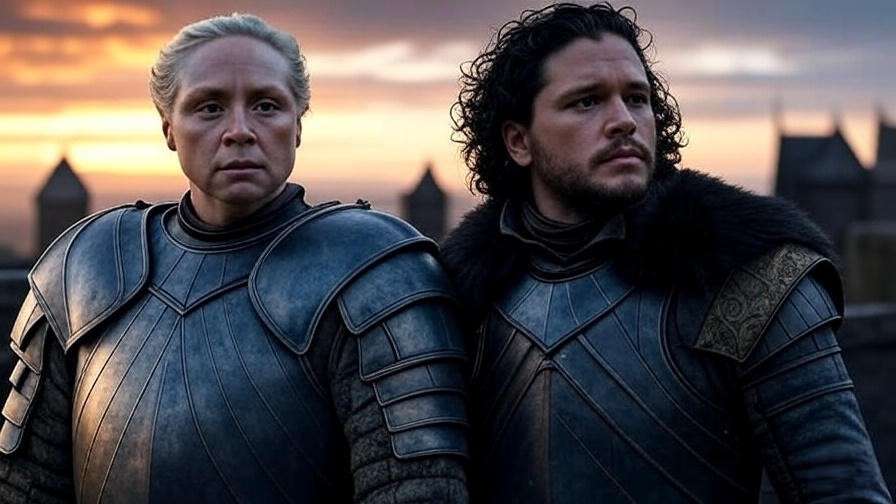Picture this: a windswept Wall, a brooding hero cloaked in black, and a secret so explosive it reshapes the fate of Westeros. Jon Snow, the stoic bastard of House Stark, has long been a fan favorite in Game of Thrones. But one question has haunted fans since the series began: Is Jon a Targaryen? This burning query, steeped in mystery and speculation, lies at the heart of the show’s intricate narrative. Unraveling Jon’s true lineage not only satisfies curiosity but also unlocks the deeper political and emotional stakes of the Seven Kingdoms. In this comprehensive guide, we’ll dive into the clues, revelations, and implications of Jon’s heritage, piecing together the puzzle of his identity with expert analysis and show evidence. Whether you’re a die-hard fan or a curious newcomer, this article will clarify the truth behind Jon Snow’s Targaryen connection and why it matters.
The Origins of the Mystery: Why Jon’s Lineage Matters
Jon Snow’s parentage is no mere plot twist—it’s a cornerstone of Game of Thrones that ties into the series’ themes of power, destiny, and identity. Raised as Ned Stark’s illegitimate son, Jon’s outsider status defines his journey, from his time at Winterfell to his leadership in the Night’s Watch. Yet, whispers of a grander heritage linger. The question “Is Jon a Targaryen?” isn’t just about his bloodline; it’s about his claim to the Iron Throne, his role in the battle against the White Walkers, and his place in the prophecy of the Prince That Was Promised. Understanding this mystery requires examining the clues scattered across the series, from subtle foreshadowing to jaw-dropping revelations.
The Stakes of Jon’s Identity
- Political Implications: A Targaryen lineage would position Jon as a potential heir to the Iron Throne, challenging Daenerys Targaryen’s claim.
- Prophetic Significance: The Azor Ahai prophecy and the Prince That Was Promised suggest a hero born of fire and blood—hallmarks of House Targaryen.
- Emotional Weight: Jon’s belief that he’s a Stark bastard shapes his honor and humility. Learning he’s a Targaryen would force him to confront his identity and loyalties.
Clues to Jon’s Targaryen Heritage in Game of Thrones
The Game of Thrones TV series, based on George R.R. Martin’s A Song of Ice and Fire, masterfully plants seeds of Jon’s true parentage. Let’s break down the evidence, season by season, that points to Jon being a Targaryen.
Season 1: Early Hints of a Secret
From the outset, Game of Thrones establishes Jon as an enigma. Ned Stark’s refusal to name Jon’s mother sparks curiosity. When Catelyn Stark presses Ned about Jon’s origins, his guarded response—“He’s my blood”—is deliberately vague. This ambiguity hints at a deeper truth. Additionally, Jon’s physical appearance—dark hair and Stark-like features—contrasts with the silver hair and violet eyes of traditional Targaryens, yet this aligns with the books’ description of Rhaegar Targaryen’s children, who often inherited their mother’s traits.
Key Clue: Ned’s honor-bound secrecy about Jon’s mother suggests he’s protecting a dangerous truth, possibly tied to the fallen Targaryen dynasty.
Season 3: The Tower of Joy Foreshadowing
The mystery deepens in Season 3 with Bran Stark’s visions and stories of the past. While not explicitly shown, references to the Tower of Joy—a pivotal location in Robert’s Rebellion—begin to surface. Fans learn that Lyanna Stark, Ned’s sister, was “abducted” by Rhaegar Targaryen, sparking the war that toppled the Targaryens. This sets the stage for the R+L=J theory, which posits that Jon is the son of Lyanna Stark and Rhaegar Targaryen.
Key Clue: The mention of Lyanna and Rhaegar’s controversial relationship plants the idea that Jon could be their child, hidden by Ned to protect him from Robert Baratheon’s wrath.
Season 6: The Tower of Joy Revelation
The confirmation comes in Season 6, Episode 10, “The Winds of Winter.” Through Bran’s greenseer visions, we witness the Tower of Joy scene. Young Ned Stark finds Lyanna dying in childbirth, whispering, “Promise me, Ned.” A baby—revealed to be Jon—is handed to Ned, who vows to protect him. The show doesn’t explicitly state Rhaegar as the father, but the context is clear: Lyanna and Rhaegar’s love produced Jon, making him a Targaryen by blood.
Key Clue: The Tower of Joy scene directly links Jon to Lyanna, with Rhaegar as the implied father, cementing the R+L=J theory.
Season 7: The Final Confirmation
In Season 7, Episode 7, “The Dragon and the Wolf,” Bran and Samwell Tarly piece together the puzzle. Bran’s visions confirm Rhaegar and Lyanna were married in a secret ceremony, making Jon their legitimate son, not a bastard. Sam’s discovery of a High Septon’s diary corroborates this, revealing Rhaegar’s annulment of his marriage to Elia Martell. Jon’s true name is revealed as Aegon Targaryen, a legitimate heir to the Iron Throne.
Key Clue: The marriage of Rhaegar and Lyanna legitimizes Jon, elevating him from a Stark bastard to a Targaryen prince.
Analyzing the R+L=J Theory: Evidence and Implications
The R+L=J theory—Rhaegar plus Lyanna equals Jon—is one of the most celebrated fan theories in Game of Thrones. Let’s explore why it holds up and what it means for Jon’s arc.
Why R+L=J Makes Sense
- Narrative Coherence: The theory ties together disparate plot threads, from Robert’s Rebellion to the White Walker threat. Jon’s Targaryen blood explains his ability to ride dragons (seen in Season 8) and his resistance to fire, a trait associated with some Targaryens.
- Thematic Resonance: Jon’s dual heritage—Stark honor and Targaryen fire—embodies the series’ central motif of ice and fire, symbolizing balance.
- Foreshadowing: Subtle hints, like Daenerys’s visions in the House of the Undying (referencing a “blue rose” linked to Lyanna), reinforce the theory.
Implications for Jon’s Character
- Claim to the Throne: As Aegon Targaryen, Jon has a stronger claim than Daenerys, creating tension in their alliance.
- Identity Crisis: Learning he’s not Ned’s son but a Targaryen forces Jon to grapple with his loyalty to the Starks and his duty to Westeros.
- Prophetic Role: Jon’s Targaryen blood ties him to the Azor Ahai prophecy, positioning him as a potential savior against the White Walkers.
Jon’s Targaryen Traits: Fire and Blood in Action
While Jon lacks the classic Targaryen look, his actions and abilities reflect his heritage. Let’s examine how his Targaryen blood manifests.
Dragon Affinity
In Season 8, Jon rides Rhaegal, one of Daenerys’s dragons, a feat only Targaryens are known to accomplish. This moment confirms his bloodline, as dragons instinctively bond with those of Targaryen descent.
Fire Resistance
While not as pronounced as Daenerys’s ability to walk through flames, Jon shows subtle signs of heat tolerance. In Season 1, he burns his hand saving Jeor Mormont from a wight but recovers quickly, hinting at a latent Targaryen trait.
Leadership and Charisma
Like Rhaegar, Jon possesses a magnetic quality that inspires loyalty. His ability to unite the wildlings, Night’s Watch, and Northern houses mirrors Rhaegar’s reputed charisma.
The Political Fallout: Jon vs. Daenerys
Jon’s Targaryen heritage creates a seismic shift in the battle for the Iron Throne. As a legitimate heir, he threatens Daenerys’s claim, leading to conflict in Season 8. Their romantic relationship, revealed to be incestuous, complicates matters further. The revelation also strains Jon’s alliances with the Starks, who rally behind Sansa and Northern independence.
Key Moments
- Sansa’s Ambition: Sansa’s distrust of Daenerys grows when she learns Jon is a Targaryen, pushing her to advocate for Northern sovereignty.
- Daenerys’s Reaction: Daenerys demands Jon keep his heritage secret, fearing it undermines her claim. Her paranoia foreshadows her descent into tyranny.
- Jon’s Choice: True to his Stark upbringing, Jon prioritizes honor over power, ultimately rejecting the throne.
The Role of Prophecy: Is Jon the Prince That Was Promised?
The Targaryen connection ties Jon to the prophecy of the Prince That Was Promised, a savior destined to defeat darkness. While the show leaves this ambiguous, several clues point to Jon:
- Born Amidst Salt and Smoke: Jon’s birth at the Tower of Joy, following a bloody rebellion, aligns with prophetic imagery.
- Lightbringer Symbolism: Jon’s leadership against the White Walkers, culminating in Arya’s killing of the Night King, suggests he fulfills the prophecy indirectly.
- Targaryen Blood: The prophecy’s association with fire and blood makes Jon’s heritage a key factor.
Counterarguments: Could Jon Not Be a Targaryen?
To ensure a balanced analysis, let’s consider alternative theories. While R+L=J is widely accepted, some fans speculated other possibilities early on:
- Ned and Ashara Dayne: Some theorized Jon was the son of Ned and Ashara Dayne, a Dornish noblewoman. However, the show’s focus on Lyanna and Rhaegar dismisses this.
- Robert Baratheon’s Son: Another theory suggested Jon was Lyanna’s son with Robert, but this lacks textual or visual support.
- No Targaryen Traits: Critics argue Jon’s lack of silver hair or overt fire resistance weakens the Targaryen claim, but the show counters this with his dragon-riding ability.
These alternatives, while intriguing, lack the narrative weight and evidence of R+L=J.
Why Jon’s Targaryen Identity Matters to Fans
Jon’s heritage resonates because it subverts traditional fantasy tropes. He’s not a chosen one who embraces power but a reluctant hero who rejects it. His Targaryen blood adds complexity to his character, blending Stark duty with Targaryen destiny. For fans, it answers long-standing questions while raising new ones about legacy, loyalty, and leadership.
Fan Reactions
- Satisfaction: The Season 6 and 7 reveals thrilled fans who had speculated about R+L=J for years.
- Controversy: Some felt the show underutilized Jon’s heritage in Season 8, as he never claims the throne.
- Emotional Impact: Jon’s struggle with his identity mirrors fans’ own questions about belonging and purpose.
How Jon’s Heritage Shapes the Ending of Game of Thrones
In Season 8, Jon’s Targaryen identity drives the narrative toward its tragic conclusion. His decision to kill Daenerys, after her destruction of King’s Landing, reflects his commitment to protecting Westeros over personal ambition. Exiled to the Night’s Watch, Jon returns to his roots, but his Targaryen heritage leaves an indelible mark on his legacy.
Key Takeaways
- Sacrifice: Jon’s choice to prioritize the greater good over power embodies his dual Stark-Targaryen values.
- Legacy: As Aegon Targaryen, Jon’s story redefines what it means to be a hero in Westeros.
- Unresolved Questions: The show leaves open whether Jon’s heritage will influence future stories, such as potential spin-offs.
Comparing Jon’s Targaryen Identity to the Books
While this article focuses on the Game of Thrones TV series, it’s worth noting how Jon’s heritage is handled in George R.R. Martin’s A Song of Ice and Fire books, as fans often compare the two. The R+L=J theory originates in the books, with similar clues—Ned’s secrecy, Lyanna’s “promise me,” and Rhaegar’s obsession with prophecy. However, the books haven’t yet confirmed Jon’s parentage as explicitly as the show, leaving room for speculation.
Key Differences
- Legitimacy: The show confirms Rhaegar and Lyanna’s marriage, making Jon a legitimate Targaryen. The books hint at this but haven’t finalized it, as Martin’s narrative remains incomplete.
- Prophecy: The books delve deeper into the Prince That Was Promised and Azor Ahai, with more textual clues tying Jon to these roles.
- Character Focus: The books give more insight into Rhaegar’s motivations, portraying him as a prophetic figure obsessed with fulfilling destiny, which adds depth to Jon’s potential role.
Note for Fans: While the show provides closure, Martin’s upcoming books (The Winds of Winter and A Dream of Spring) may offer new twists on Jon’s heritage, making it a topic to watch.
The Cultural Impact of Jon’s Targaryen Reveal
Jon’s Targaryen identity isn’t just a plot point—it’s a cultural phenomenon that sparked countless fan theories, Reddit threads, and YouTube analyses. The R+L=J theory, born in online forums, became one of the most discussed topics in Game of Thrones fandom. Its confirmation in Seasons 6 and 7 validated years of speculation, cementing the show’s reputation for rewarding attentive viewers.
Why It Resonated
- Fan Engagement: The reveal rewarded fans who pieced together clues, fostering a sense of community and shared discovery.
- Narrative Payoff: The slow buildup, from Ned’s secrecy to Bran’s visions, made the reveal satisfyingly earned.
- Emotional Stakes: Jon’s journey from outcast to potential king tugged at fans’ heartstrings, blending triumph with tragedy.
How Jon’s Heritage Fits into Game of Thrones’ Broader Themes
Jon’s Targaryen blood ties into the series’ core themes, making his identity a lens through which to view Game of Thrones as a whole.
Ice and Fire
The title A Song of Ice and Fire reflects the duality of Jon’s heritage. His Stark side (ice) embodies duty, loyalty, and the North, while his Targaryen side (fire) represents passion, power, and destiny. Jon’s arc bridges these forces, uniting disparate factions against the White Walkers.
Power and Sacrifice
Jon’s refusal to claim the throne underscores the series’ critique of power. Unlike Daenerys, who succumbs to the allure of the Iron Throne, Jon sacrifices personal ambition for the greater good, embodying the show’s message that true leadership requires selflessness.
Identity and Belonging
Jon’s struggle to reconcile his Stark upbringing with his Targaryen heritage mirrors the series’ exploration of identity. Characters like Theon Greyjoy and Sansa Stark also grapple with who they are versus who they’re meant to be, making Jon’s journey universally relatable.
Practical Takeaways for Game of Thrones Fans
For fans seeking to dive deeper into Jon’s Targaryen heritage, here are actionable ways to engage with the topic:
- Rewatch Key Episodes: Focus on Season 6, Episode 10 (“The Winds of Winter”) and Season 7, Episode 7 (“The Dragon and the Wolf”) for the pivotal reveals.
- Read the Books: Explore A Game of Thrones and A Dance with Dragons for textual clues about R+L=J, keeping an eye on Ned’s and Bran’s chapters.
- Join Fan Communities: Platforms like Reddit’s r/asoiaf or X discussions offer vibrant debates about Jon’s role and future in Martin’s books.
- Analyze Prophecies: Study the Prince That Was Promised and Azor Ahai legends in wikis or fan analyses to connect Jon’s heritage to the bigger picture.
- Discuss with Friends: Share this article and spark conversations about Jon’s impact on Game of Thrones—what did his Targaryen reveal mean to you?
Looking Ahead: Jon Snow’s Legacy in Future Stories
While Game of Thrones concluded in 2019, Jon’s Targaryen heritage continues to fuel speculation about spin-offs. HBO’s Snow, a proposed sequel series, could explore Jon’s life beyond the Wall, potentially delving into how his Targaryen blood shapes his future. Even without a confirmed series, Jon’s story remains a touchstone for fans, symbolizing the enduring allure of Westeros.
Potential Spin-Off Ideas
- Beyond the Wall: Could Jon’s Targaryen instincts lead him to uncover new threats or allies among the wildlings?
- Targaryen Legacy: Might Jon’s heritage inspire a new generation to reclaim the Targaryen name?
- Prophetic Fulfillment: Could unexplored prophecies tie Jon to future conflicts in Westeros?
Final Thoughts
Jon Snow’s Targaryen heritage—confirmed as Aegon Targaryen, son of Rhaegar and Lyanna—answers the question “Is Jon a Targaryen?” with a resounding yes. This revelation transforms Game of Thrones from a tale of survival into a saga of destiny, power, and sacrifice. By tracing the clues, from Ned’s secrecy to Bran’s visions, we see how Jon’s identity reshapes the Seven Kingdoms. His journey, blending Stark honor with Targaryen fire, captivates because it speaks to universal themes of belonging and purpose. Whether you’re analyzing episodes, debating theories, or awaiting Martin’s next book, Jon’s story invites endless exploration. What’s next for the Targaryen prince? Only time—and perhaps a spin-off—will tell.
Conclusion
The question “Is Jon a Targaryen?” is more than a plot twist—it’s the key to understanding Game of Thrones’ deepest themes. Jon Snow, revealed as Aegon Targaryen, embodies the clash of ice and fire, duty and destiny. From subtle clues in Season 1 to the seismic revelations of Seasons 6 and 7, his journey from bastard to prince captivates audiences. By exploring his lineage, we uncover the heart of Westeros’s political and prophetic stakes. Whether you’re rewatching the series or diving into fan theories, Jon’s Targaryen heritage offers endless layers of intrigue. What’s your take on Jon’s true identity? Share your thoughts, and let’s keep the Game of Thrones conversation alive.
Frequently Asked Questions About Jon Snow’s Targaryen Heritage
To further address the search intent behind “Is Jon a Targaryen?” and provide comprehensive value to readers, let’s tackle some common questions fans have about Jon Snow’s lineage. These FAQs draw on Game of Thrones show evidence, expert analysis, and fan discussions to clarify lingering doubts and enhance understanding.
1. How Was Jon Snow’s Targaryen Identity Kept Secret?
Ned Stark’s decision to raise Jon as his own son was a masterclass in secrecy, driven by love and duty. After Lyanna’s death at the Tower of Joy, Ned knew that Robert Baratheon, who despised Targaryens, would kill Jon if his true parentage were revealed. By claiming Jon as his bastard, Ned protected him, even at the cost of his own honor and his marriage to Catelyn. The show emphasizes Ned’s sacrifice, showing his silence as a testament to his loyalty to Lyanna.
Key Detail: Only a few characters, like Howland Reed (present at the Tower of Joy), likely knew the truth, reinforcing the secrecy’s airtight nature.
2. Why Didn’t Jon Look Like a Targaryen?
Unlike Daenerys’s silver hair and violet eyes, Jon’s dark hair and Stark-like features raised doubts among fans. However, this is consistent with Targaryen genetics in A Song of Ice and Fire. Children of Targaryen parents often inherit traits from their non-Targaryen parent. Lyanna Stark’s Northern features dominated Jon’s appearance, just as Rhaegar’s daughter Rhaenys resembled her Dornish mother, Elia Martell.
Key Detail: The show subtly nods to this through Jon’s resemblance to Lyanna, seen in Bran’s visions, dispelling the need for stereotypical Targaryen traits.
3. What Does Jon’s Targaryen Name, Aegon, Signify?
Naming Jon “Aegon Targaryen” carries immense weight. Aegon, a name tied to Aegon the Conqueror, signals Jon’s potential as a unifier of Westeros. However, it also sparked debate, as Rhaegar already had a son named Aegon with Elia Martell. The show suggests Rhaegar chose the name to honor the legacy of Targaryen kings, possibly believing Jon was destined for greatness.
Key Detail: The name Aegon ties Jon to the prophecy of the Prince That Was Promised, as it evokes Targaryen destiny and leadership.
4. Did Jon’s Targaryen Heritage Affect His Relationship with Daenerys?
Absolutely. Jon’s revelation as a Targaryen creates a complex dynamic with Daenerys. Their romantic relationship in Season 7, unaware of their aunt-nephew connection, becomes a source of tension once the truth emerges. Daenerys fears Jon’s stronger claim to the throne, while Jon struggles with the incestuous implications and his loyalty to the Starks. This conflict culminates in Season 8, where Jon’s heritage fuels Daenerys’s paranoia, contributing to her tragic downfall.
Key Detail: The show uses their relationship to explore themes of love, power, and betrayal, with Jon’s Targaryen blood as the catalyst.
5. Could Jon Have Ruled as a Targaryen King?
While Jon had the opportunity to claim the Iron Throne, his character arc suggests he was never suited for it. His Stark upbringing prioritized duty over ambition, and his rejection of the crown aligns with his belief in a united Westeros over personal power. Fans debate whether Jon could have been a just king, but the show frames his exile to the Night’s Watch as a fitting end, allowing him to protect the realm without ruling it.
Key Detail: Jon’s refusal to seize power mirrors Ned Stark’s honor, showing how his dual heritage shapes his choices.


















